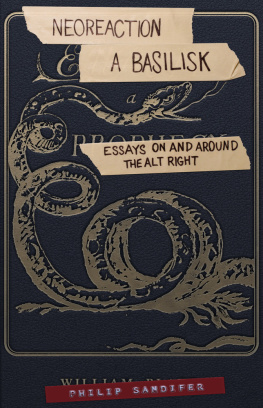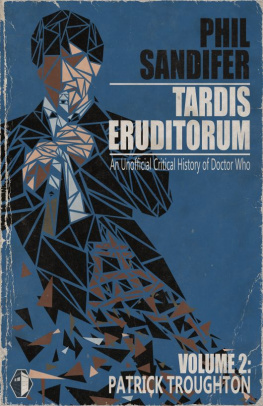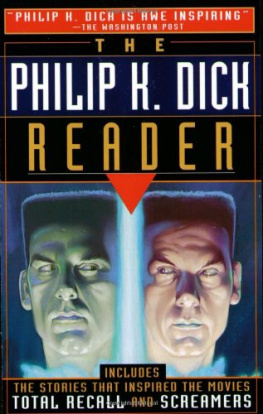Philip Sandifer - Neoreaction a Basilisk
Here you can read online Philip Sandifer - Neoreaction a Basilisk full text of the book (entire story) in english for free. Download pdf and epub, get meaning, cover and reviews about this ebook. year: 0, genre: Science. Description of the work, (preface) as well as reviews are available. Best literature library LitArk.com created for fans of good reading and offers a wide selection of genres:
Romance novel
Science fiction
Adventure
Detective
Science
History
Home and family
Prose
Art
Politics
Computer
Non-fiction
Religion
Business
Children
Humor
Choose a favorite category and find really read worthwhile books. Enjoy immersion in the world of imagination, feel the emotions of the characters or learn something new for yourself, make an fascinating discovery.
- Book:Neoreaction a Basilisk
- Author:
- Genre:
- Year:0
- Rating:3 / 5
- Favourites:Add to favourites
- Your mark:
- 60
- 1
- 2
- 3
- 4
- 5
Neoreaction a Basilisk: summary, description and annotation
We offer to read an annotation, description, summary or preface (depends on what the author of the book "Neoreaction a Basilisk" wrote himself). If you haven't found the necessary information about the book — write in the comments, we will try to find it.
Neoreaction a Basilisk — read online for free the complete book (whole text) full work
Below is the text of the book, divided by pages. System saving the place of the last page read, allows you to conveniently read the book "Neoreaction a Basilisk" online for free, without having to search again every time where you left off. Put a bookmark, and you can go to the page where you finished reading at any time.
Font size:
Interval:
Bookmark:
Neoreaction a Basilisk
Philip Sandifer
Copyright 2016
Kickstarter Ebook Edition
First and foremost, this book would not exist were it not for David Gerard, to whom it was basically serialized in e-mail as I wrote it, and who performed the copyedit on the manuscript. He was an invaluable resource in pointing me towards the sources I needed to make the argument, fine-tuning the jokes, and generally making this entire mad caper work.
Thanks also to Jack, Sam, Jane, and Alex for podcasting about the book with me and giving me a variety of insights that helped in fine-tuning it, and to Veronica for her helpful comments on some of the early sections.
The book was also fine-tuned and improved (as well as promoted) by the many people who reviewed and talked about the manuscript during the Kickstarter. Particular thanks are due to Rob, aka nostalgebraist, whose thoughtful comments were an honor to have inspired. And to Nick Land, cause its funny.
Speaking of whom, although many of the sources that shaped the book are obvious from reading it, one important one is not. A major push in writing it was Park MacDougalds fine essay The Darkness Before the Right, which introduced me to the bewildering rabbit hole that is Nick Land. A nod also to Kieron Gillen, who linked MacDougalds piece on Twitter, and whose fault this therefore technically is.
Finally, my profound thanks to the 708 Kickstarter backers who made this book possible. My gratitude is immense, and I hope it lives up to your expectations.
Do you know that every time you turn another page, you not only get us closer to the monster at the end of this book, but you make a terrible mess? - Grover, The Monster at the End of This Book
Let us assume that we are fucked. The particular nature of our doom is up for any amount of debate, but the basic fact of it seems largely inevitable. My personal guess is that millennials will probably live long enough to see the second Great Depression, which will blur inexorably with the full brunt of climate change to lead to a massive human dieback, if not quite an outright extinction. But maybe itll just be a rogue AI and a grey goo scenario. You never know.
There are several reactions we might have to this realization, and many of us have more than one. The largest class of these reactions are, if not uninteresting, at least relatively simple, falling under some category of self-delusion or cognitive dissonance. From the perspective of 2016 the eschaton appears to be in exactly the wrong place, such that were either going to just miss it or only see the early shitloads of people dying bits. And even if it is imminent, there is no reason to expect most of us to engage with it differently than any other terminal diagnosis, which is to say, to minimize the amount of time we spend consciously dying. Indeed, my polite authorial recommendation would be to do exactly that if you are capable, probably starting by simply not reading this.
Hm. Well, no one to blame but yourself, I suppose. A second category, marginally more interesting, is what we might call decelerationist approaches. (The name is a back formation from the accelerationists, more about whom later.) These amount to attempts to stave off the inevitable as best as possible; perhaps by attempting to reduce carbon emissions and engage in conservation efforts to minimize the impact of the anthropocene extinction or by writing fanfic to conjure the AI Singularity or something. These efforts are often compatible with active self-delusion, and in most regards the current political system is a broad-based coalition of these two approaches. But the decelerationist is at least engaged in a basic project of good. I tend to think the project is doomed (although being wrong about that would be lovely), however, and this work is on the whole aimed at those who similarly feel somewhat unsatisfied with decelerationism.
From this point the numbering of categories becomes increasingly untenable as we enter the constellation of approaches to which this book is broadly directed; those whose reaction towards the eschaton is not simply or primarily an effort to evade it. This includes the outright accelerationists, whose attitude is that the eschaton should be brought about ASAP, but also those for whom the eschaton is an object of fantasy and dread - those who imagine it but do not necessarily wish to bring it about, and those who attempt to predict and plan for it, for whom the future, by definition almost but not quite present, hangs like looming weather, lurking like a memory.
It is born out of a frustration with the genre of sprawlingly mad manifesto-like magnum opuses in this area, a genre that at times seems dominated, at least in terms of practical influence, by an AI crank, a racist technolibertarian, and a literal madman philosopher. I do not mean to suggest that these constitute the entirety of significant eschatological thought, and certainly not the best of it. Indeed, I find all them at best unsatisfying and at worst loathsome for a variety of reasons, generally ones born of political leftism. Nor is it to suggest that there is some sort of coherent position these three thinkers map out; their influences on each other are substantial, and theres an entire school of thought, generally known as neoreaction, thats heavily influenced by all three, but they are three distinct thinkers who have different and ultimately irreconcilable goals. They simply collectively form an object of definable scope, the exploration of which seems likely to yield some useful perspective on the end of all things. To start, then, let us look at the big three manifesto-writing visionaries alluded to above, namely Eliezer Yudkowsky, Curtis (aka Mencius Moldbug), and Nick Land.
Well start with Eliezer Yudkowsky, who is the one of the three to emphatically not be a neoreactionist, and indeed prone to getting quite cross at the suggestion that he has anything to do with them. The official description of Eliezer Yudkowsky, and by this I of course mean the first sentence of his Wikipedia article, is that he is an American artificial intelligence researcher known for popularizing the idea of friendly artificial intelligence. Being Wikipedia, most of this is almost right. The material bulk of Yudkowskys output would make him best described as a science blogger, although AI researcher and novelist are both factually accurate, as, for that matter, is American. And while friendly artificial intelligence is certainly an idea hes discussed, its a little hyper-specific to describe someone whos more broadly a popularizer of the AI Singularity; a sort of Ray Kurzweil for the millennialist set. His own website, meanwhile, begins with the description that hes a man who wears more than one hat. If one wanted to be snarkily uncharitable - and if its not clear, this is very much the sort of book that does - one could say that this is true, but that all of his hats are the same color and dont quite flatter.
But none of this quite captures the uncanny strangeness that makes Yudkowsky so compelling, both as a writer to take seriously and as a bizarre symptom to obsessively pick at in pursuit of obscure and likely disreputable goals. And however easy he is to mock (and any writer worth their salt is easy to mock), he is indeed both of these things. This strangeness comes from the sort of outsized ambition of his work. The largest single piece, a series of blog posts now collected as a six-volume book entitled Rationality: From AI to Zombies, but more typically known as the Sequences. Its title belies its scope slightly, in that it picks two disparate but fanciful things to form its range; it is of the largely abandoned genre of from-first-principles systemic philosophical worldviews, of a genuine intellectual heft comparable to Kants Critiques, assuming you dont much care for Kants critiques.
Next pageFont size:
Interval:
Bookmark:
Similar books «Neoreaction a Basilisk»
Look at similar books to Neoreaction a Basilisk. We have selected literature similar in name and meaning in the hope of providing readers with more options to find new, interesting, not yet read works.
Discussion, reviews of the book Neoreaction a Basilisk and just readers' own opinions. Leave your comments, write what you think about the work, its meaning or the main characters. Specify what exactly you liked and what you didn't like, and why you think so.











